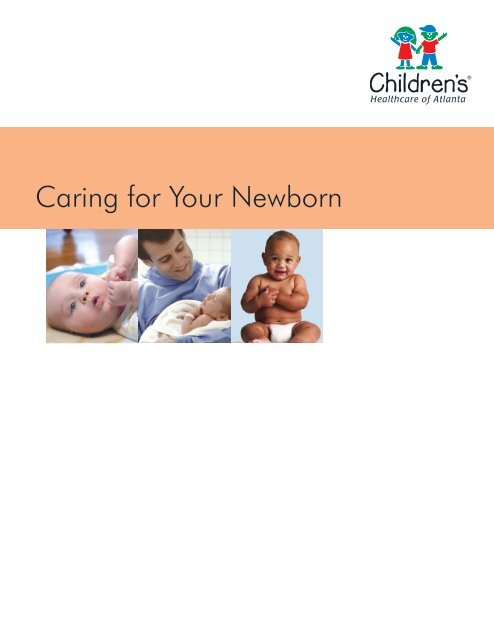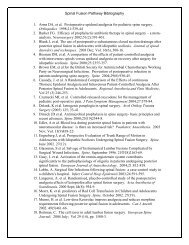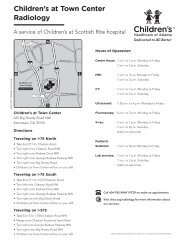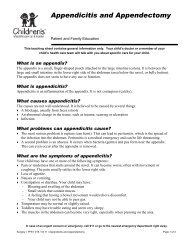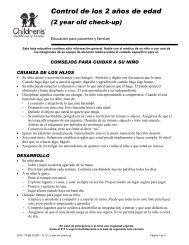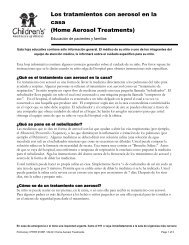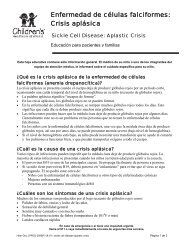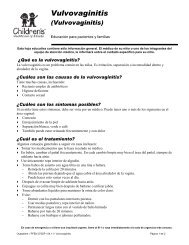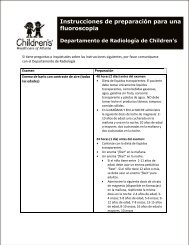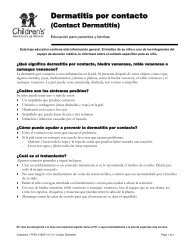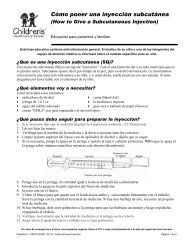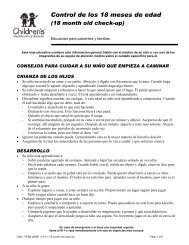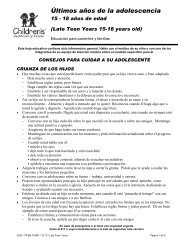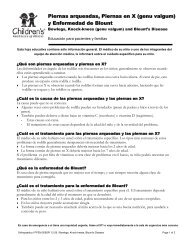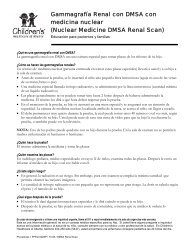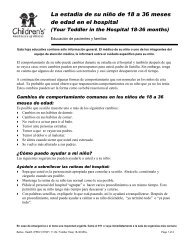Caring for Your Newborn - Children's Healthcare of Atlanta
Caring for Your Newborn - Children's Healthcare of Atlanta
Caring for Your Newborn - Children's Healthcare of Atlanta
Create successful ePaper yourself
Turn your PDF publications into a flip-book with our unique Google optimized e-Paper software.
<strong>Caring</strong> <strong>for</strong> <strong>Your</strong> <strong>Newborn</strong>
My Address<br />
My phone number<br />
My work phone number<br />
My baby’s name and date <strong>of</strong> birth<br />
My baby’s health problems<br />
My baby’s medicines<br />
My baby’s allergies<br />
My baby’s doctor<br />
Phone number<br />
Address<br />
My drug store phone number<br />
Georgia Poison Control<br />
Georgia Poison Control <strong>for</strong><br />
hearing impaired persons:<br />
Emergency In<strong>for</strong>mation<br />
Tear or cut this page out <strong>of</strong> the book if you want to hang it<br />
by your phone or on the refrigerator.<br />
In case <strong>of</strong> emergency dial 911 or your local ambulance<br />
In<strong>for</strong>mation<br />
Medical in<strong>for</strong>mation<br />
1<br />
404-616-9000 or 800-222-1222<br />
404-616-9287<br />
In case <strong>of</strong> an urgent concern or emergency, call 911 or go to the nearest emergency room right<br />
away. This is general in<strong>for</strong>mation and is not specific medical advice <strong>for</strong> your child. Always consult<br />
your child’s doctor or other healthcare provider if you have any questions or concerns about the care<br />
or health <strong>of</strong> your child.
HEALTH CARE VISITS<br />
Use this chart to help keep track <strong>of</strong> your baby’s:<br />
• Well baby visits<br />
• Illnesses<br />
• Injuries<br />
• Immunizations<br />
Date Reason <strong>for</strong> Visit Treatment and Medicines<br />
2
<strong>Caring</strong> <strong>for</strong> <strong>Your</strong> <strong>Newborn</strong><br />
Congratulations on your new baby! <strong>Your</strong> baby will bring great joy and excitement to<br />
your life. Having a baby also raises many questions <strong>for</strong> most parents. This booklet can<br />
help answer some basic questions about caring <strong>for</strong> him. For easier reading, we will use<br />
the words “he or him” when we talk about your baby -<br />
even if your baby is a girl.<br />
Babies need a lot <strong>of</strong> love and care. Helping your baby feel<br />
loved and secure is the most important thing you can<br />
do. You do this when you:<br />
• Hold, rock, snuggle and hug your baby<br />
• Talk or sing to him in a quiet, gentle voice<br />
• Respond to him when he cries<br />
• Feed and change him<br />
• Keep him clean and warm<br />
• Keep him safe<br />
• Seek medical care when he is sick<br />
If you ever have an urgent concern or emergency with your baby, call 911 right<br />
away.<br />
For routine matters, ask your baby’s doctor when you have any questions or concerns<br />
about your baby.<br />
3
PART 1<br />
<strong>Your</strong> Baby<br />
You may have questions about what is normal and what is not normal <strong>for</strong> your baby. Each<br />
baby is different. Some things that new babies do seem strange, but are very normal. New<br />
parents <strong>of</strong>ten worry because they don’t know what is normal. Call your baby’s doctor if<br />
you are worried about your baby.<br />
These things can be normal <strong>for</strong> new babies:<br />
• Shaking or trembling <strong>of</strong> the:<br />
– Chin or lower lip<br />
– Arms and legs while crying<br />
– Hands and feet<br />
• Irregular breathing<br />
– Breathing may look like a seesaw <strong>of</strong> the chest and tummy between<br />
breaths<br />
• Stuffy nose with snorty, noisy breathing<br />
• Hiccoughs, sneezing, burping, yawning and gurgling<br />
• Spitting up once in awhile<br />
• Startle reflex<br />
– This is when your baby stiffens or jumps when he hears a sound<br />
• Straining, grunting or turning red with a bowel movement (BM)<br />
• Passing gas<br />
• Dry, peeling skin, especially on the hands and feet<br />
• Some rashes<br />
• Eyes crossing<br />
– Babies eyes cannot focus yet, but they can clearly see things<br />
8 - 10 inches away from their face<br />
Holding<br />
HOW MUCH SHOULD I HOLD MY BABY?<br />
<strong>Newborn</strong> babies need to feel safe and loved. Hold your baby a lot. Hold your baby <strong>for</strong><br />
com<strong>for</strong>t, <strong>for</strong> feeding and <strong>for</strong> play. Look into your baby’s face and talk to him. Don’t<br />
worry that you are going to spoil your baby.<br />
4
HOW SHOULD I HOLD MY BABY?<br />
There are different ways to hold your baby.<br />
• You may hold your baby over your shoulder, in your arms or on your lap.<br />
• When you hold your baby, make sure to support his head. <strong>Newborn</strong> babies don’t have<br />
strong enough muscles to support their head by themselves.<br />
• Support your baby’s body well so that he does not fall.<br />
• Do not allow children to hold a baby without an adult watching them. Make sure the<br />
child sits down on a chair or couch with an adult close by.<br />
Over the shoulder –<br />
hand and arm on<br />
back and head<br />
Cradle hold<br />
CAN OTHER PEOPLE HOLD MY BABY?<br />
Do not allow your newborn baby to be passed around to a lot <strong>of</strong> people. Babies do not<br />
have strong immune systems and they can get sick easily. Have your family members<br />
wash their hands with soap and water be<strong>for</strong>e holding the baby. Anyone who is sick should<br />
not hold your baby.<br />
Feeding<br />
WHAT SHOULD I FEED MY BABY?<br />
Breastfeeding is recommended <strong>for</strong> babies. If you choose to bottle feed, there are many<br />
store bought <strong>for</strong>mulas to choose from. Talk with your doctor about which <strong>for</strong>mula is best<br />
<strong>for</strong> your baby.<br />
Give your baby only breastmilk or <strong>for</strong>mula until the doctor tells you to begin feeding him<br />
cereal and other foods. He does not need water or juice or until then.<br />
5<br />
Football hold
To help prevent problems with your baby’s new teeth, even be<strong>for</strong>e they come in:<br />
• Never prop a bottle. This can lead to tooth decay. It can also cause ear infections.<br />
• Wipe your baby’s gums with a clean, wet cloth after each feeding.<br />
BREASTFEEDING<br />
• Fresh breastmilk (that has never been refrigerated or<br />
frozen) is good at room temperature <strong>for</strong> 5 hours. It is good<br />
in the refrigerator <strong>for</strong> 5 days.<br />
• Breastfed babies need Vitamin D drops by 2 months<br />
<strong>of</strong> age.<br />
– Ask your baby’s doctor about how many Vitamin D<br />
drops to give.<br />
– Also ask the doctor if your baby needs any<br />
other supplements such as iron.<br />
FORMULA<br />
• Throw away any room temperature <strong>for</strong>mula after 2 hours.<br />
• Formula made from powder can be stored in the refrigerator <strong>for</strong><br />
24 hours.<br />
• Formula made from liquid concentrate can be stored in the refrigerator<br />
<strong>for</strong> 48 hours.<br />
• Do not clean your baby’s pacifier or bottle nipple by putting it in your mouth. <strong>Your</strong><br />
saliva may contain germs that can cause problems and tooth decay <strong>for</strong> your baby.<br />
HOW SHOULD I FEED MY BABY?<br />
ALWAYS hold your baby when you feed him. Never prop the bottle or leave him alone<br />
when he is eating.<br />
• This could cause your baby to choke<br />
• It can increase the risk <strong>of</strong> ear infections<br />
• It can also cause tooth decay<br />
Holding your baby while you feed him is also important <strong>for</strong><br />
bonding. Feeding time is an important time <strong>for</strong> your baby to feel<br />
love from you.<br />
• Feeding your baby gives him both nutrition and security.<br />
6
• <strong>Your</strong> baby needs to be held and feel loved.<br />
• Try to feel calm and relaxed when you feed your baby.<br />
WHEN SHOULD I START MY BABY ON FOOD?<br />
Do not give your new baby any solid food – new babies are not ready <strong>for</strong> food yet.<br />
• Solid foods are anything other than breastmilk or <strong>for</strong>mula. This includes such things<br />
as cereal, baby food, applesauce, mashed potatoes and yogurt.<br />
• Giving your baby food might make him choke or cause him to develop allergies.<br />
• Most times, babies start on food around 6 months <strong>of</strong> age.<br />
• Never give your baby honey. Honey sometimes contains germs that can harm babies less<br />
than 1 year old.<br />
• Talk with your doctor to help decide when to start your baby on food.<br />
HOW MUCH SHOULD MY BABY EAT?<br />
Most babies know when they are hungry and know when they are full. Let your baby tell<br />
you when he is ready to eat. Feed your baby 8-12 times a day on-demand. This means<br />
that anytime your baby seems hungry – feed him.<br />
• Babies may eat different amounts at different feedings. This is OK. Sometimes he might<br />
be hungrier than other times.<br />
• Make sure your baby has at least 6-8 wet diapers during a 24 hour period.<br />
• Sometimes, your baby may only need to suck and not eat. You can let him suck on a<br />
pacifier or on his hands.<br />
HOW OFTEN SHOULD I BURP MY BABY?<br />
Burping your baby can help decrease spitting up. Burping releases gas trapped in<br />
your baby’s stomach.<br />
• Burp your baby halfway through the feeding. Then burp him after the feeding<br />
is finished.<br />
• You may sit your baby on your lap with one <strong>of</strong> your hands supporting his chin and head.<br />
Gently pat your baby’s back with the other hand.<br />
• Or you may put your baby over your shoulder and support him with one hand. Gently<br />
pat him on the back with the other.<br />
• Always have a towel handy when you burp your baby. <strong>Your</strong> baby might spit-up a little<br />
when you burp him. This is normal.<br />
7
Sitting burp Shoulder burp<br />
Bathing and Skin Care<br />
HOW SHOULD I BATHE MY BABY?<br />
Give your baby a sponge bath <strong>for</strong> the first week or two until his belly button and/or<br />
circumcision are healed.<br />
Once your baby’s belly button and circumcision have healed, give him a bath in a baby<br />
bath tub or sink. Be careful, wet babies are slippery.<br />
Do not EVER leave your baby alone in bath water –<br />
not even <strong>for</strong> a second. ALWAYS be with your baby<br />
while he is in the water.<br />
• Clean the tub or sink well be<strong>for</strong>e putting your baby in it.<br />
• Have a clean washcloth and towel, soap, shampoo and<br />
any other supplies you need with you be<strong>for</strong>e you<br />
get started.<br />
8
• Use warm bath water. The water should not be so cool that your baby will get cold and<br />
not so hot that he will get burned.<br />
• Wipe <strong>of</strong>f his face and head with a damp washcloth and plain water.<br />
• Use a washcloth and mild soap to wash all over your baby’s body.<br />
• Rinse your baby <strong>of</strong>f well to remove any soap. Dry him well when you get done so he<br />
does not get cold.<br />
HOW OFTEN SHOULD I BATHE MY BABY?<br />
A newborn baby does not need to have a bath everyday. Too much bathing can dry the<br />
skin. NEVER leave your baby alone in bath water, not even <strong>for</strong> a minute.<br />
• You can give your baby a full bath every 2-3 days after the belly button and/or<br />
circumcision is healed.<br />
• Wipe <strong>of</strong>f your baby’s hands with a damp washcloth and mild soap several times a day to<br />
keep his hands clean. <strong>Your</strong> baby puts his hands in his mouth <strong>of</strong>ten.<br />
• Wipe your baby’s face and neck each day with plain water and a s<strong>of</strong>t washcloth. Also<br />
wipe any milk from his face and neck as needed.<br />
• Clean around the diaper area each time you change a diaper. You may use a cloth with<br />
soap and warm water or disposable baby-wipes.<br />
Skin Care<br />
<strong>Your</strong> baby should not need any powders, lotions or oils on his skin. Talk with your doctor<br />
be<strong>for</strong>e you use <strong>of</strong> any <strong>of</strong> these products. When you take your baby outside, protect his<br />
skin from wind and sun.<br />
• Cover his head and skin or stay in the shade with him.<br />
• Do not use sunscreen or insect repellant until your baby is at least 6 months old.<br />
Nail Care<br />
SHOULD I TRIM MY BABY’S FINGERNAILS?<br />
Babies sometimes need their fingernails trimmed so that they don’t scratch themselves.<br />
• Be very careful and only trim <strong>of</strong>f the rough edges on the nails. Baby’s nails are s<strong>of</strong>t and<br />
if you trim them too closely they might bleed.<br />
• <strong>Your</strong> doctor or nurse can show you how to trim your baby’s nails if you have questions.<br />
• If your baby is scratching himself, you can also buy hand protectors to go over his hands.<br />
9
Clothing<br />
HOW SHOULD I DRESS MY BABY?<br />
Dress your newborn in the same way that you would be com<strong>for</strong>table plus one extra layer.<br />
Clothes should not be too tight or too loose.<br />
• If you would be com<strong>for</strong>table in a long sleeved T-shirt, then your baby will be com<strong>for</strong>table<br />
in a long sleeved T-shirt and a light sweater or blanket.<br />
• Don’t wrap your baby in lots <strong>of</strong> layers if it isn’t cold. But don’t dress your baby in just<br />
a T-shirt if you need a sweatshirt to stay warm.<br />
• <strong>Your</strong> baby does not need to wear shoes. Socks or booties can keep his feet warm<br />
• Do not overdress your baby. This can cause your baby to be too warm. Babies who are<br />
too warm have more <strong>of</strong> a chance <strong>for</strong> crib death (also called SIDS or Sudden Infant Death<br />
Syndrome) when they sleep.<br />
Sleeping<br />
WHERE SHOULD MY BABY SLEEP?<br />
Have your baby sleep in his own crib without any pillows or heavy blankets in the crib<br />
with him.<br />
• If you like, bring the crib or bassinet into your bedroom so you can have your baby close<br />
to you.<br />
• <strong>Your</strong> baby should NOT sleep in the bed with you or other children.<br />
– He could suffocate from the pillows or blankets.<br />
– He could also be injured from someone rolling on him.<br />
• <strong>Your</strong> baby should also NOT sleep on a couch or chair.<br />
– He could suffocate from sliding between the pillows.<br />
– He could also be injured from rolling onto the floor.<br />
It is OK <strong>for</strong> your baby to fuss a little be<strong>for</strong>e he falls asleep. If your baby is fussy be<strong>for</strong>e<br />
sleeping, talk to him and pat him. You don’t need to pick him up every time. It is good<br />
<strong>for</strong> your baby to learn to soothe himself to sleep.<br />
10
WHAT POSITION SHOULD MY BABY SLEEP IN?<br />
Use a firm mattress without anything else in the crib such as:<br />
• Pillows or blankets<br />
• Toys or stuffed animals<br />
• Crib bumpers<br />
ALWAYS lay your baby on his back to<br />
sleep. This is the safest position <strong>for</strong> him<br />
to sleep unless your doctor tells you<br />
something different. Laying him on his<br />
back helps to prevent crib death, also<br />
called Sudden Infant Death Syndrome<br />
(SIDS).<br />
HOW MUCH SHOULD MY BABY SLEEP?<br />
<strong>Newborn</strong> babies sleep a lot. They can sleep between 17 and 20 hours a day. <strong>Your</strong> baby:<br />
• Should wake up every 2 to 4 hours to eat and be changed<br />
• Needs to eat 8 to 12 times a day<br />
• Needs to have 6 to 8 wet diapers a day<br />
<strong>Your</strong> baby should be fully awake when you feed him. If you think your baby is sleeping<br />
so much that he isn’t eating enough, or if you have a hard time waking your baby up <strong>for</strong><br />
feedings, talk to your doctor.<br />
Crying<br />
WHAT SHOULD I DO IF MY BABY IS CRYING?<br />
Crying is normal <strong>for</strong> babies. Babies usually cry when they are hungry, wet, bored,<br />
uncom<strong>for</strong>table or when they need to be held.<br />
When your baby cries, check to see if he:<br />
• Is hungry, wet or soiled<br />
• Is com<strong>for</strong>table and that he isn’t too hot or too cold<br />
• Needs to be burped<br />
<strong>Your</strong> baby may just need to be held and com<strong>for</strong>ted. Babies need a lot <strong>of</strong> love, cuddling<br />
and holding. See if holding or rocking your baby settles him down. Do not be afraid <strong>of</strong><br />
spoiling your baby by holding him. New babies cannot be spoiled.<br />
11
If your baby is crying <strong>for</strong> over an hour and none <strong>of</strong> these things seem to com<strong>for</strong>t him, call<br />
your doctor. <strong>Your</strong> baby may need to come into the <strong>of</strong>fice <strong>for</strong> a visit.<br />
If your baby is crying a lot and you feel like you cannot cope with the crying anymore,<br />
get help. Never, ever shake your baby.<br />
Wet Diapers and Bowel Movements<br />
Babies should have 6-8 wet diapers a day. This shows that your baby is getting enough to<br />
drink. Call your baby’s doctor if you notice a decrease in wet diapers<br />
HOW OFTEN SHOULD MY BABY HAVE A BOWEL MOVEMENT?<br />
How <strong>of</strong>ten a baby has a bowel movement is<br />
different <strong>for</strong> each baby.<br />
• Some babies have several bowel<br />
movements a day.<br />
• Older babies might have one bowel<br />
movement every other day or every couple<br />
<strong>of</strong> days. As long as your baby’s bowel<br />
movements are s<strong>of</strong>t, you don’t need to<br />
worry.<br />
WHAT SHOULD MY BABY’S BOWEL MOVEMENTS LOOK LIKE?<br />
Bowel movements look different <strong>for</strong> each baby.<br />
• Bowel movements should be s<strong>of</strong>t. Sometimes they might even be seedy or liquid.<br />
• It is normal <strong>for</strong> a baby’s bowel movements to be brown, yellow or green<br />
• It is normal <strong>for</strong> some baby’s bowel movements to smell bad<br />
• Let your doctor know if your baby’s bowel movements are:<br />
– Hard<br />
– Black, red, pink or white in color<br />
– Blood tinged or if you see any blood in them<br />
12
Outings<br />
Avoid taking your baby into crowds <strong>of</strong> people <strong>for</strong> the first few months. This includes such<br />
things as family parties, trips to the mall or going to an amusement park. <strong>Newborn</strong> babies<br />
have weak immune systems and can catch germs easily. <strong>Your</strong> baby can go outside <strong>for</strong><br />
outings as long as the weather is nice.<br />
• Be sure to protect your baby from wind and sun.<br />
• Use a hat and lightweight clothes to protect your baby from the sun. Or, stay in the<br />
shade when possible.<br />
• Do not use sunscreen or insect repellant until your baby is at least 6 months old.<br />
Tummy Time<br />
Place your baby on his back to sleep. When your baby is awake, make sure that he spends<br />
some time on his tummy. Always stay with your baby when he is on his tummy. This<br />
helps to keep him safe and also gives you time together to cuddle or play. Tummy time<br />
helps to:<br />
• Build strong muscles in your baby's neck, shoulders and arms. This helps when he<br />
begins to roll, crawl and sit.<br />
• Prevent a flat spot on the back <strong>of</strong> his head.<br />
Use these ideas <strong>for</strong> tummy time <strong>for</strong> your new baby. As you do them, gently turn his head<br />
from side to side:<br />
• Carry your baby over your shoulder and gently support his head. This gives him tummy<br />
time while snuggling against you at the same time.<br />
• Carry your baby using a football hold. Instead <strong>of</strong> placing him in your arms with his<br />
tummy and face up, place his tummy and face down. Support his chest and body with<br />
your arm.<br />
• Lie on your back and place your baby on your chest facing you. As he grows, he can lift<br />
his head and look at you.<br />
• Lay your baby on your lap or over your knees with his tummy and face down.<br />
• Change your baby's position during the day. Do not leave your baby sitting in a baby<br />
carrier or bouncer seat <strong>for</strong> a long time.<br />
ONCE YOUR BABY IS A FEW MONTHS OLD:<br />
• Play with him on the floor. Place toys on both sides <strong>of</strong> him. Help him lift his head to<br />
see and reach <strong>for</strong> the toys.<br />
• Place him on the floor and put a small blanket or towel under his chest. Help him use his<br />
arms to lift his head <strong>of</strong>f the floor.<br />
• Continue to lay your baby on your lap or over your knees with his tummy and face down.<br />
13
PART 2<br />
Common Concerns with Babies<br />
Belly Button (Umbilicus)<br />
<strong>Your</strong> baby will have a dried cord on his belly button <strong>for</strong> about 2 weeks after being born.<br />
The dried cord will dry up and fall <strong>of</strong>f on its own. Leave the area alone and let it heal by<br />
itself.<br />
• Only give sponge baths until the dried cord falls <strong>of</strong>f.<br />
• <strong>Your</strong> baby’s doctor will tell you if you should use alcohol to clean the dried cord.<br />
• Never pull <strong>of</strong>f any part <strong>of</strong> the dried cord. Just let it fall <strong>of</strong>f by itself when it is ready to.<br />
• You may see some dried blood around the belly button. This is normal.<br />
• Let your doctor know if you see any active bleeding, oozing or swelling or notice a bad<br />
smell coming from the belly button.<br />
Small Bumps on <strong>Your</strong> Baby’s Head (Cephalohematomas)<br />
Cephalohematomas are small, s<strong>of</strong>t bumps on either side <strong>of</strong> a new baby's head. The bumps<br />
are made up <strong>of</strong> blood that collects under the scalp after a baby travels through the narrow<br />
birth canal during delivery. The bumps usually go away on their own in about 6 weeks.<br />
Circumcision<br />
If your baby had a circumcision right after birth, you will need to check it each time you<br />
do a diaper change. Circumcisions are usually red and will take a week or more to heal.<br />
• Apply petroleum jelly, such as Vaseline® on your baby’s penis each time you do a<br />
diaper change.<br />
– This keeps the skin from sticking to the diaper<br />
– Do this <strong>for</strong> 5-7 days or until the redness is gone<br />
• Only give sponge baths until the circumcision is healed<br />
• Let your doctor know if the area bleeds, has any drainage or a bad smell.<br />
S<strong>of</strong>t Spots on <strong>Your</strong> Baby’s Head (Fontanels)<br />
All babies have 2 s<strong>of</strong>t spots on the top <strong>of</strong> their head. These spots are where the bones <strong>of</strong><br />
the skull have not grown together all the way yet. This is normal.<br />
14
• Be careful with these spots because the hard skull bones do not protect this part <strong>of</strong> the<br />
brain yet.<br />
• The skull bones will close and the s<strong>of</strong>t spots will disappear when your baby is about<br />
12 - 18 months old.<br />
Jaundice<br />
Jaundice means that the skin and eyes have a yellow color. It is caused by extra bilirubin<br />
in the blood after birth. This is a common problem in about half <strong>of</strong> all newborns.<br />
• Let your doctor know if you think your baby looks yellow or has any skin color changes.<br />
<strong>Your</strong> baby may need a blood test to make sure that the bilirubin level is not too high.<br />
• <strong>Your</strong> doctor will let you know if your baby needs any treatment <strong>for</strong> the jaundice.<br />
Colic<br />
WHAT IF MY BABY HAS COLIC?<br />
If your baby cries <strong>for</strong> long periods at a time and you cannot find a reason <strong>for</strong> his crying,<br />
talk to your doctor. If your doctor says that your baby may have colic:<br />
• Colic is when a healthy baby cries <strong>for</strong> more than 3 hours a day.<br />
• No one knows why some babies have colic.<br />
• It goes away on its own between 3 and 6 months <strong>of</strong> age.<br />
• Medicines do not usually help.<br />
Try and com<strong>for</strong>t your baby. Take a break from a crying baby when you need to. Most<br />
babies outgrow colic in a few months.<br />
Some tips to help if your baby has colic:<br />
• Feed your baby less and feed him more <strong>of</strong>ten. Do not give him too much at one time.<br />
• Feed your baby slowly. Burp him <strong>of</strong>ten.<br />
• Allow your baby to suck on a pacifier or on his fingers or fist.<br />
• If your baby is taking <strong>for</strong>mula, talk with your baby’s doctor about a change.<br />
• Try moving with your baby – this sometimes helps.<br />
– Walk with him upright over your shoulder.<br />
– Carry him against your stomach in a baby pouch.<br />
– Try rocking, swinging or pushing him in a stroller.<br />
– Put him in a car seat and go <strong>for</strong> a ride in the car.<br />
15
• Lay your baby across your lap and gently rub his back.<br />
• Place him in warm water in a baby tub or sink. Be sure to NOT leave him alone.<br />
• Gently rub his stomach.<br />
Colic can upset everyone in the family. Do not get angry and shake or hit your baby if he<br />
is crying a lot. He cannot control his crying.<br />
Some tips to help you when your baby has colic:<br />
• Take a break once in awhile. Place your baby in his crib and walk away <strong>for</strong> a few<br />
minutes. Watch TV or listen to music.<br />
• Get enough rest.<br />
• Ask a friend to stay with your baby <strong>for</strong> awhile. Go <strong>for</strong> a walk or play with your other<br />
children <strong>for</strong> awhile.<br />
If your baby is crying a lot and you feel like you cannot cope with the crying anymore,<br />
get help. Never, ever shake your baby.<br />
Diaper Rash<br />
If your baby has a lot <strong>of</strong> redness or a rash around his bottom, inner thighs or genitals<br />
(private parts), he may have a diaper rash. It he does:<br />
• Clean his skin with a mild soap like Dove® and warm water. Do not use baby wipes.<br />
• Use a store bought diaper rash cream on his skin if needed. Zinc oxide creams, like<br />
Desitin® usually work well. Spread it over all the reddened areas each time you change<br />
his diaper.<br />
If your baby is getting a lot <strong>of</strong> diaper rashes, you may need to change his diaper more<br />
<strong>of</strong>ten. Tell your doctor know if your baby has a lot <strong>of</strong> diaper rashes or if his skin has any<br />
open sores.<br />
Skin Problems<br />
Many newborns have rashes or other skin problems. Some normal skin conditions include<br />
dry skin, birth marks, peeling skin, acne and a bumpy looking rash.<br />
If your baby has blisters or has a new rash along with a fever or trouble breathing,<br />
let you doctor know right away.<br />
16
A rash on the chin or cheeks that comes and goes is normal.<br />
• It can be from contact with <strong>for</strong>mula or from spitting up.<br />
• Keep your baby’s face and neck clean and dry. Use a cool washcloth <strong>for</strong> rash relief.<br />
Call your baby’s doctor if your baby has any:<br />
• Rash that is not getting better as expected<br />
• Blisters (small, fluid filled bumps) that occur during the first month <strong>of</strong> life<br />
• Other signs <strong>of</strong> illness such as a fever, trouble breathing or excess sleepiness<br />
WHAT IF MY BABY HAS ACNE?<br />
<strong>Newborn</strong> acne is common. You might notice small red bumps on the cheeks, chin or<br />
<strong>for</strong>ehead that looks like the acne that teenagers have. This is normal and will disappear<br />
on its own after the first few weeks <strong>of</strong> life.<br />
• No treatment is needed<br />
• Creams, oils or lotions might make the acne worse<br />
• Never squeeze acne bumps on your baby’s skin<br />
WHAT IF MY BABY HAS DRY SKIN?<br />
Dry, flaky skin is normal <strong>for</strong> newborns while they adjust to life outside the womb. It is<br />
more common on the hands and feet.<br />
• This is normal and should go away when your baby is about 4 weeks old.<br />
• Lotions, creams and oils are not needed.<br />
WHAT IF MY BABY HAS BIRTH MARKS?<br />
<strong>Your</strong> baby might have one or more birthmarks. This is normal. Be sure to tell your doctor<br />
if the birthmark changes in color, grows larger or bleeds. <strong>Your</strong> doctor will tell you if your<br />
baby needs any treatment.<br />
• Pink birthmarks (called stork bites) are common on the nose, eyelids or back <strong>of</strong> the neck.<br />
These are normal and will usually clear up without treatment.<br />
• Red birthmarks that are raised may appear around 3 weeks <strong>of</strong> age. They become larger<br />
and then usually fade away by 6 to 8 years <strong>of</strong> age. They usually do not need any treatment.<br />
• Some birthmarks can be brown like freckles or a mole.<br />
WHAT IF MY BABY HAS CRADLE CAP?<br />
Cradle cap is a scalp condition <strong>of</strong>ten seen in infants. It can occur from a few weeks to a<br />
few months <strong>of</strong> age. The cause is not known. It should be treated to avoid spreading and<br />
to prevent a possible infection.<br />
17
You might notice<br />
PART V<br />
• Redness on the scalp<br />
• Greasy, white or yellow scales over the scalp<br />
<strong>Your</strong> doctor will talk to you about what to do <strong>for</strong> your baby. Some <strong>of</strong> the treatments might<br />
include:<br />
• Brushing your baby’s scalp lightly with a s<strong>of</strong>t brush once a day<br />
• Using a baby shampoo as advised by your baby’s doctor<br />
If your baby does have cradle cap, call your baby’s doctor if there is:<br />
• Swelling, redness or pain<br />
• Drainage from the scalp<br />
• A bad smell from the area<br />
• Fever (temperature over 100.3˚F or 38˚C)<br />
Stuffy Nose<br />
WHAT IF MY BABY HAS A STUFFY NOSE?<br />
<strong>Newborn</strong> babies <strong>of</strong>ten have a stuffy nose. Their noses are very small and they are getting<br />
used to making mucous. Sometimes your baby might have noisy breathing if he has a<br />
stuffy nose.<br />
• Wipe your baby’s nose with a damp washcloth if you need to.<br />
• Make sure that your baby does not have a fever. If your baby has a fever, call your doctor.<br />
• If your baby is sleeping more than usual or is not feeding well, call your doctor.<br />
If your baby is having any trouble breathing, call 911 right away. This may include<br />
if your baby any <strong>of</strong> these signs:<br />
• Is working very hard to breathe or finds it hard to take a breath<br />
• Grunts when he breathes<br />
• Has chest retractions (skin pulling in around the ribs and chest when breathing)<br />
• Has a blue or dark purple color to the nail beds, lips or gums<br />
• Stops breathing <strong>for</strong> more than 10 seconds<br />
• Cannot feed while trying to breathe<br />
Thrush (White Spots in the Mouth)<br />
Thrush is a common yeast infection in newborns. If your baby has white spots on his<br />
tongue, lips or inside the mouth, he might have thrush. Call your baby’s doctor if you<br />
think your baby has thrush. He may need medicine to get rid <strong>of</strong> thrush.<br />
18
Discharge From the Vagina<br />
Vaginal discharge is common in baby girls during the first few weeks <strong>of</strong> life. The<br />
discharge can be clear, milky or blood tinged. This is from the mother’s hormones and<br />
will go away on its own. No treatment is needed.<br />
Swollen Breasts<br />
It is common <strong>for</strong> babies - boys or girls - to have both breasts swell after birth. This is from<br />
the mother’s hormones and will go away on its own. No treatment is needed.<br />
If your baby’s breast is swollen and is also red or tender, call your baby’s doctor right<br />
away. <strong>Your</strong> baby could have an infection.<br />
Taking your Baby’s Temperature<br />
WHEN SHOULD I TAKE MY BABY’S TEMPERATURE?<br />
Take your baby’s temperature anytime you think he isn’t acting well or feels too hot. If<br />
your baby is crying a lot and isn’t easily com<strong>for</strong>ted, he could have a fever.<br />
HOW SHOULD I TAKE MY BABY’S TEMPERATURE?<br />
<strong>Newborn</strong> babies need to have their temperature taken in their rectum (bottom). This is the<br />
most accurate way to take a temperature in a newborn. Follow the steps below <strong>for</strong> taking<br />
a temperature <strong>for</strong> your newborn.<br />
• Use a digital thermometer. Do not use a glass thermometer.<br />
• Lay your baby on his stomach across your lap or in his crib. Keep one hand on his back<br />
to hold him safely.<br />
• You can also lay your baby on his back and lift up his legs like you do when you change<br />
his diaper<br />
• Dip the tip <strong>of</strong> the thermometer in petroleum jelly, like Vaseline®<br />
• Turn the thermometer on.<br />
• Put the thermometer 1 ⁄2 to 1 inch (2-3cm) into your baby’s bottom. Hold it in place.<br />
• Listen <strong>for</strong> the signal or beep.<br />
• Remove the thermometer.<br />
• Read the number and write it down on paper.<br />
19
If your baby has any fever in the first 2 months <strong>of</strong> life that the doctor does not<br />
know about yet, call his doctor right away. A fever is a rectal temperature over<br />
100.3˚F (38˚C).<br />
If your 2- 6 month old baby has any fever over 102.2˚F (39˚C) that the doctor does<br />
not know about yet, call his doctor right away.<br />
PART 3<br />
Safety<br />
To help keep your baby safe, NEVER, EVER:<br />
• Leave your baby alone except in a crib. Always be within hearing distance or use a baby<br />
monitor in case your baby needs you.<br />
• Leave your baby alone in a car.<br />
• Hold your baby in your lap when you ride in the car.<br />
• Leave your baby alone in a sink or bathtub – not even to get a towel or answer the door<br />
or phone.<br />
• Place a necklace on your baby.<br />
• Use ribbons or strings to tie a pacifier around your baby’s neck. This can cause choking.<br />
• Warm <strong>for</strong>mula or breastmilk in a microwave. This can cause “hot spots” in the milk that<br />
can burn your baby.<br />
• Prop a bottle to feed your baby.<br />
• Shake your baby. This can cause brain damage, blindness and death.<br />
Car Seats<br />
ALWAYS use a car seat EVERY TIME your baby rides in<br />
the car. This is the law.<br />
• Put your baby in the car seat without any blankets<br />
between him and the straps across his chest and lap.<br />
Be sure the straps are buckled and secure.<br />
• Put the car seat in the back seat <strong>of</strong> the car. Face the car<br />
seat towards the rear window until he is 1 year old AND<br />
weighs at least 20 pounds (9 Kg).<br />
• Strap the car seat into the car. Be sure that the straps are<br />
buckled and secure.<br />
20
• Make sure there is no slack in the shoulder straps. You should not be able to fit 1 finger<br />
under the straps.<br />
• Put the chest (retainer) clip at armpit level to keep the shoulder straps in place.<br />
• Read the car seat instructions and your car owner’s manual. They can help you make<br />
sure that the seat is installed correctly.<br />
• Buckle and secure the straps every time you use the car seat to carry your baby – even<br />
if it is not in the car.<br />
• Never place the seat on a high place, such as a counter, and walk away.<br />
• Set a good example <strong>for</strong> your family - wear your seatbelt too.<br />
Crib and Playpen Safety<br />
To help prevent crib death (Sudden Infant Death Syndrome or SIDS):<br />
• Always place your baby on his back to sleep.<br />
• Only use approved cribs, bassinets and playpens <strong>for</strong> your baby.<br />
• Have your baby sleep in a crib or bassinette - not in a playpen. Babies should only be in<br />
a playpen when an adult is nearby watching them.<br />
• Do not use any pillows, heavy blankets, bumper pads, stuffed toys or other toys or<br />
decorations that could cause suffocation.<br />
• Do not allow your baby to sleep in beds with family members, on waterbeds or on couches.<br />
• Do not overdress your baby. This can cause your baby to be too warm. Babies who are<br />
too warm have more <strong>of</strong> a chance to have SIDS when they sleep.<br />
Smoking<br />
Do not allow anyone to smoke near your baby. If anyone in your home smokes, ask them<br />
to smoke outside <strong>of</strong> your home. Babies are sensitive to cigarette smoke and can become<br />
ill from breathing in the smoke.<br />
• Cigarette smoke gets into clothes, hair, furniture and cars. All <strong>of</strong> these things need to<br />
stay smoke free to help your baby stay healthy.<br />
• Have a smoker remove or change their shirt or jacket be<strong>for</strong>e coming back into the house.<br />
• <strong>Your</strong> baby can become ill from being around people who have smoked recently. Some<br />
illnesses include:<br />
– Asthma<br />
– Breathing problems<br />
– Colds and sinus infections<br />
– Ear infections<br />
21
Shaking<br />
NEVER shake your baby or let anyone else shake your baby. Shaking can cause<br />
blindness and brain damage. These things do not go away.<br />
• If you are ever worried that you may want to shake or hurt your baby, call your doctor<br />
right away. Talk with your doctor about your feelings. <strong>Your</strong> doctor can help.<br />
• If you think your baby is in danger <strong>of</strong> being shaken or being hurt by someone, call 911<br />
right away.<br />
• If your baby has already been shaken or hurt, call 911 right away.<br />
Medicine Safety<br />
To help keep your baby safe when giving him medicines:<br />
• Only give your baby medicines that your doctor knows about.<br />
• Read all medicine labels 3 times be<strong>for</strong>e giving it to your baby.<br />
• Make sure you know how much medicine to give, how to give it and how <strong>of</strong>ten to give it.<br />
• Be sure to use the dropper that comes with the medicine. Do not use a dropper from<br />
one medicine to give another medicine.<br />
• Do not give children less than 2 years <strong>of</strong> age any over-the-counter cough or cold<br />
medicines unless your doctor tells you to.<br />
• Keep all medicines out <strong>of</strong> the reach <strong>of</strong> babies and children.<br />
To give your baby liquid medicines by mouth:<br />
• Shake the medicine well.<br />
• Measure the correct amount <strong>of</strong> medicine in a marked dropper, syringe or child medicine<br />
spoon. You can buy these at your local drug store <strong>for</strong> a dollar or two.<br />
DO NOT use kitchen spoons – they are not accurate.<br />
• Use a dropper, syringe or a baby bottle or nipple to give the<br />
medicine.<br />
– If you use a dropper or oral syringe – point the tip towards your<br />
baby’s cheek and give it slowly.<br />
– If you use an oral syringe that has a cap on the tip, be sure to take<br />
the cap <strong>of</strong>f the tip be<strong>for</strong>e putting it in your baby’s mouth.<br />
– If you use a nipple, put the medicine in the nipple and let your<br />
baby suck on it.<br />
- If you put your baby’s medicine into his bottle, only use a small amount <strong>of</strong> breast milk<br />
or <strong>for</strong>mula to mix with the medicine. This way, you will know that he gets all the medicine.<br />
22
Fall Safety<br />
To help keep your baby safe from falls:<br />
• Never leave your baby unattended. Even if your baby is sleeping in his crib, be nearby<br />
so you can hear him.<br />
• Never let your baby sleep on couches or regular beds – he could roll <strong>of</strong>f and fall.<br />
• Always buckle your baby into his car or infant seat – even if he isn’t in the car.<br />
• Never set your baby in his car or infant seat on a high surface.<br />
• Always keep one hand on your baby while he is on the changing table. Use the strap on<br />
the table <strong>for</strong> added safety.<br />
• Keep stairs clear and use a handrail when carrying your baby.<br />
• Do not allow young children to carry your baby.<br />
• Never throw your baby up into the air and catch him as you play with him.<br />
Strangulation, Suffocation and Choking<br />
Babies need to be protected from accidental strangulation, suffocation and choking. They<br />
can’t protect themselves when they are young and need you to watch <strong>for</strong> these things.<br />
Strangulation means to have something press on or constrict the windpipe and cut <strong>of</strong>f the air<br />
supply to the lungs. To help prevent strangulation:<br />
• Never put pacifiers on a ribbon or cord that goes around his neck.<br />
• Never place a necklace on your baby.<br />
• Never place any type <strong>of</strong> cord around your baby’s neck.<br />
• Make sure there are no window blind cords near your baby’s crib.<br />
• Never hang stringed objects in your baby’s crib.<br />
• Take <strong>of</strong>f bibs be<strong>for</strong>e putting your baby in the crib.<br />
Suffocation means to have something cover the nose and mouth and cut <strong>of</strong>f the air supply to<br />
the lungs. To keep your baby safe from suffocation:<br />
• Be sure to check the nipples on your bottles – if they have any holes or tears throw<br />
them out.<br />
• Don’t use heavy blankets, sheets, stuffed toys, bumper pads or pillows in his bed.<br />
• Keep your baby away from plastic bags.<br />
• Don’t give your baby balloons or have balloons near him.<br />
23
Choking means to have small things get stuck in the windpipe and cut <strong>of</strong>f the air supply to<br />
the lungs. To keep your baby safe from choking:<br />
• Keep your baby away from small objects that could get caught in his throat.<br />
• Be sure there are no small objects like coins or buttons in your baby’s crib.<br />
• Don’t give your baby foods until he is about 6 months old<br />
Fire and Burn Safety<br />
To help protect your baby from burns and fires:<br />
• Never hold your baby when you are cooking or carrying hot liquids.<br />
• Keep your water heater set at or below 120ºF.<br />
• Have working smoke detectors in your home.<br />
– Test the batteries <strong>of</strong>ten and change them at least twice a year.<br />
– A good time to do this is when the time changes <strong>for</strong> Daylight Savings Time in<br />
spring and back to Standard Time in the fall.<br />
• Don’t let people smoke in your home and make sure no one smokes in bed.<br />
• Have a fire escape plan <strong>for</strong> your family. Practice it <strong>of</strong>ten to make sure everyone knows<br />
what to do.<br />
CPR<br />
It is a good idea to take a baby CPR (cardiopulmonary resuscitation) course if you have<br />
never had one. To find out about a class in your area:<br />
• Call the American Heart Association, the American Red Cross or your local hospital <strong>for</strong><br />
in<strong>for</strong>mation about classes <strong>for</strong> parents.<br />
• You can also go to the website www.cpranytime.org to buy kits that can help you and<br />
your family learn CPR at home.<br />
24
PART 4<br />
Visits to the Doctor<br />
<strong>Your</strong> baby needs regular check-ups to be sure he stays healthy and is growing well.<br />
• <strong>Your</strong> baby will be seen by a doctor while you are still in the hospital.<br />
• He should also be seen within 1 week after that.<br />
• Call your baby’s doctor while you are still in the hospital or right after coming home to<br />
schedule your baby’s first check-up.<br />
• <strong>Your</strong> doctor will let you know the schedule your baby should follow <strong>for</strong> future check-ups.<br />
Also call your baby’s doctor anytime you are worried about how he is doing. Call your<br />
doctor’s <strong>of</strong>fice be<strong>for</strong>e making an appointment to make sure your doctor thinks your baby<br />
needs to be seen.<br />
WHAT KINDS OF THINGS CAN MY DOCTOR DO FOR MY BABY?<br />
<strong>Your</strong> doctor can make sure that your baby:<br />
• Has all <strong>of</strong> his newborn blood tests<br />
• Is healthy and growing well<br />
• Gets all <strong>of</strong> his vaccines.<br />
<strong>Your</strong> doctor will also give you a chance to ask any questions that you have about your<br />
baby.<br />
DOES MY BABY NEED VACCINES?<br />
Yes. All babies need to have vaccines so that they stay healthy.<br />
• Vaccines protect your baby from certain diseases.<br />
• Some vaccines may make your baby cranky or give him a slight fever <strong>for</strong> a short time.<br />
Call your baby’s doctor if your baby has a fever.<br />
• If you have questions about vaccines <strong>for</strong> your baby, talk with your doctor.<br />
WHEN SHOULD I CALL THE DOCTOR?<br />
Call your baby’s doctor anytime you have a concern about how your baby looks or feels.<br />
You can also call your doctor if you have questions about how to take care <strong>of</strong> your baby.<br />
Some good times to call include anytime your baby:<br />
• Has a fever that your doctor does not know about. A fever is a temperature over<br />
100.3˚F (38˚C) rectally<br />
• Has a change in behavior<br />
25
• Does not wake up easily<br />
• Does not feed well<br />
• Cannot be com<strong>for</strong>ted with feeding, changing, burping, holding or rocking after about<br />
an hour<br />
• Vomits more than 2 times in 1 hour<br />
• Has less than 1 wet diaper every 4 – 6 hours or less than 6-8 diapers in 24 hours<br />
• Has blood in his urine or bowel movement<br />
• Falls or is burned<br />
• You have any concerns about the way your baby looks or feels<br />
When you call the doctor about a problem, have these things ready to report:<br />
• <strong>Your</strong> baby’s name<br />
• <strong>Your</strong> baby’s date <strong>of</strong> birth<br />
• <strong>Your</strong> address<br />
• <strong>Your</strong> phone number<br />
• Any allergies your baby has<br />
• What kind <strong>of</strong> problem your baby is having<br />
• Any medicines you have given your baby<br />
• <strong>Your</strong> baby’s temperature<br />
CALL 911 OR YOUR LOCAL AMBULANCE SERVICE IF YOUR BABY:<br />
• Is so weak and tired that he hardly responds to you<br />
• Is working very hard to breathe or finds it hard to take a breath<br />
• Grunts when he breathes<br />
• Has chest retractions (skin pulling in around the ribs and chest when breathing)<br />
• Has a blue or dark purple color to the nail beds, lips or gums<br />
• Stops breathing <strong>for</strong> more than 10 seconds<br />
• Cannot feed while trying to breathe<br />
• Has any problems that need care right away.<br />
26
PART 5<br />
Resources<br />
The Family Library at Children’s <strong>Healthcare</strong> <strong>of</strong> <strong>Atlanta</strong> at Egleston<br />
efamily@choa.org - 404-785-1611<br />
The Max Brown Family Library at Children’s <strong>Healthcare</strong> <strong>of</strong> <strong>Atlanta</strong> at Scottish Rite<br />
maxbrownlibrary@choa.org - 404-785-2166<br />
Books<br />
<strong>Caring</strong> <strong>for</strong> <strong>Your</strong> Baby and Young Child, Revised Edition: Birth to Age 5 –<br />
available in English and Spanish<br />
By the American Academy <strong>of</strong> Pediatrics<br />
The Baby Book: Everything You Need to Know About <strong>Your</strong> Baby from Birth to Age<br />
Two<br />
By William and Martha Sears<br />
The Mother <strong>of</strong> All Baby Books: The Ultimate Guide to <strong>Your</strong> Baby's First Year<br />
By Ann Douglas<br />
What to do when <strong>Your</strong> Child Gets Sick – available in English and Spanish<br />
By Gloria Mayer and Ann Kuklierus<br />
What to Expect the First Year – available in English and Spanish<br />
By Heidi Murk<strong>of</strong>f, Sandee Hathaway, & Arlene Eisnberg<br />
<strong>Your</strong> Baby's First Year – available in English and Spanish<br />
By the American Academy <strong>of</strong> Pediatrics<br />
<strong>Your</strong> <strong>Newborn</strong>: Head to Toe: Everything You Want to Know About <strong>Your</strong> Baby's<br />
Health through The First Year<br />
By Cara Familian Natterson<br />
27
Websites<br />
Baby care - www.intelihealth.com/IH/ihtIH/WSIHW000/29010/29754.html<br />
Baby care - www.fda.gov/opacom/lowlit/medsafe.html<br />
Child care - www.intelihealth.com/IH/ihtIH/WSIHW000/20722/20722.html?k=navx408x20722<br />
CPR (cardiopulmonary resuscitation) and first aid – www.cpranytime.org<br />
Feeding your baby - www.fda.gov/opacom/lowlit/feedbby.html<br />
Health in<strong>for</strong>mation - www.kidshealth.org and<br />
www.medem.com/MedLB/sub_detaillb.cfm?parent_id=10&act=disp<br />
How to give medicines - www.fda.gov/opacom/lowlit/medchld.html<br />
How to choose a car seat -<br />
www.intelihealth.com/IH/ihtIH/WSIHW000/29010/29720/364812.html?d=dmtContent<br />
How to install a car seat -<br />
www.intelihealth.com/IH/ihtIH/WSIHW000/29010/29720/364811.html?d=dmtContent<br />
Immunizations - www.fda.gov/opacom/lowlit/shots.html<br />
Medicine safety - www.fda.gov/opacom/lowlit/medsafe.html<br />
Children’s <strong>Healthcare</strong> <strong>of</strong> <strong>Atlanta</strong> has not reviewed all <strong>of</strong> the sites listed as resources and does not make any<br />
representations regarding their content or accuracy. Children’s <strong>Healthcare</strong> <strong>of</strong> <strong>Atlanta</strong> does not recommend or<br />
endorse any particular products, services or the content or use <strong>of</strong> any third party websites, or make any<br />
determination that such products, services or websites are necessary or appropriate <strong>for</strong> you or <strong>for</strong> the use in<br />
rendering care to patients. Children’s <strong>Healthcare</strong> <strong>of</strong> <strong>Atlanta</strong> is not responsible <strong>for</strong> the content <strong>of</strong> any <strong>of</strong> the<br />
above-referenced sites or any sites linked to these Sites. Use <strong>of</strong> the links provided on this or other sites is at<br />
your sole risk.<br />
28
PFEB021/04.08/1000<br />
©Copyright Children’s <strong>Healthcare</strong> <strong>of</strong> <strong>Atlanta</strong>, Inc. All rights reserved.


